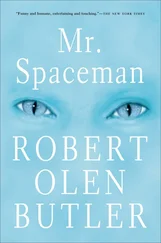Her dark eyes focus on his, but dartingly: his right, his left, back and forth, as if she does not believe the one and seeks something in the other, then seeks it in the first again, hoping what she saw a moment ago has changed. Or has not changed. Her eyes seem anxious. Only that. Their lids are rounded some by French blood. He longs to ask her to close her eyes for him to kiss her there. Surely she can read in him the feelings that produce this longing. But he senses already he will never kiss her again.
“I was afraid they killed you,” he says.
“I hide,” she says. “I have one place to hide and then I run away.”
“When did you return?”
“Few days before now,” she says. She seems to begin to say more — a taking of a breath, a lift of her chest — but she lets it go, does not speak.
He does not dare to ask the questions flaring in his head. Will she stay? Can they be together? Instead he feels the weight in his hand.
“I brought your father’s pistol,” he says.
She takes the parcel from him, saying, “I was afraid also they killed Robert.”
She looks again into his eyes. She studies him closely but with her own eyes steady now.
In the center of his chest he trembles. Standing before her gaze, given that he feared for months that she was dead, he is slow to fully understand the trembling. He takes it simply for passion.
“He did help you?” she asks.
Robert does not understand.
She sees this.
“My father,” she says, lifting the parcel a little.
“He saved my life,” Robert says, wishing he could believe it was as simple as that.
She nods. Her eyes are growing bright from nascent tears.
He aches to lift a hand. To touch her face. But he knows what’s next. It was always to come to this. Surely it was. But they’ve lost so many nights already. And those nights still before him in this country — eighty-seven more, the count on the calendar on the wall beside his bed — now that she is safe, now that she is here, at least some of those nights could be made to feel as if he were never going to leave her. As if she could somehow go with him.
But he already understands there will be no more nights.
“I am glad,” she says. “My father can like you.”
“Could have liked,” he says. The man is dead. The correction is a wistful reflex. She has always asked that he correct her English. She has always wanted to be perfect in her English for him.
“My father could have liked you,” she says.
They wait.
He feels something shift in her.
“You understand,” she says. You must. You should. You will. You can’t.
“That you must go?” he says.
She smiles. She has heard herself leap in her words in a way that he should not have been able to follow. But he has. They have always understood each other. And so her smile quickly fades. And the tears begin to fall.
She does not wipe them away. She does not avert her gaze.
“I understand,” he says. And he feels his own eyes growing warm.
“I cannot see this,” she says. Very gently. He knows she means his tears.
He looks away to the river to hide them. The seemingly incessant clouds of Hue keep the water the color of cheap jade. Today, beneath an empty sky, the Perfume River flows blue.
He says, “You’ll leave Hue?”
“Yes,” she says.
He thinks he is in control of himself now. He looks back to her.
“I love you beaucoup much forever,” she says.
Before they can laugh at her irony — she has used the catchphrase of the bargirls — she touches his hand, a fleeting wisp of a touch, and she turns and walks quickly away.
Watching her go, he understands his earlier trembling. It was not entirely passion. The trembling would also have had him speak to Lien about the man he killed. She was the one person who might have been able to absolve him.
But it’s too late. And as he watches the white flutter of her ao dai , the long drape of her black hair as she leaves him, his trembling returns. Now, though, it is indeed passion. The last feeling he will ever have while his eyes are actually upon her is this ache to take her in his arms and hold her as close as he can.
In the following months, his active passion for Lien slowly faded. She was gone forever, irretrievable, this woman he’d loved. Whatever was uniquely left of her within him, he could not, would not consider. Dared not.
That was in another country. A country at war. He worked hard to see Lien as a Vietnamese woman. He focused on the otherness of Vietnamese women, on the seemingly universal kinesthetics of them — the feeling in his chest and arms and loins for their smallness, for their softness of parts and hardness of will, for the glide of them. And so all of those qualities faded from him once he returned to the States and to the women who had shaped his desire from boyhood. These Americans were the women — in their diversity, in the scale of them — who were imprinted on him. Then, in a coffee shop in Baton Rouge, Louisiana, he felt his physical desire embed itself in a long-shared culture, in a shared cast of mind, in another woman’s uniqueness, an American woman. He was ready for Darla.
And now, in this dark room, on the night his father fell and began to hasten toward death, his remembrance of lost passion flows on in him like a river of cerulean blue and enters the sea: Darla, earlier this evening, as she emerges from her study. He stands at her door, as is their way. Whoever of them first notices that it has passed a certain hour will go to the other and wait at the door. And she emerges as she always does, with a faintly startled look as she returns to him from the realm of her mind, and she gives him a soft sigh, as if yes, the workday is through and there you are and I am glad. And he feels, as he sometimes does at this, a swell of tenderness. He felt it when he stood in her office door this evening and he feels it again now, in this moment, in this bed, and Robert wishes to take Darla into his arms and hold her as close as he can.
He turns onto his side.
She is lying with her back to him.
He pauses.
Between Robert and Darla, when did sleep begin to trump desire? It has. And thoroughly enough that even as he desires her now, this is not a question he asks himself. He simply pauses from the fact of it. Perhaps it began after a certain number of years together, after they had come to a certain bone-deep familiarity; perhaps there was a crucial time or two when he turned to her and she was sleeping and, in waking to his touch, she simply patted the beseeching hand and coiled back into unconsciousness. Or perhaps it was she who first touched him in this way. For neither of them was it understood as a general policy. But something soon shifted. Being of a certain age, perhaps they indeed preferred their sleep and respected this preference in each other. And telling themselves it was only about this or that particular night, they did not realize what else might come of it.
Bob knows where he is. He is inside his head and his head is a deer tick swollen fat and he dare not move or a gnarled and hairy hand — it’s the hand of God, if you want to face facts, and Bob is ready to face facts — the hand of God will reach down and take his head between thumb and forefinger and He will squeeze and Bob’s head will explode with blood. All Bob can think to do is put his own hands on his head and try to hold it together. He draws his arms out from beneath the sheets, and he knows where he is. A thing he must learn over and over today, it seems. He’s in the eight-bed observation unit off the emergency room. He’s been here before for something or other. The place smells of his mother. Her Clorox. Her sponging it on kitchen cabinets, on counters, on the sink in their single-wide. Her hands smelled like this place. Always. Softly, she would grunt and growl and wheeze at the sponging, she would weep at the sponging. He puts his hands on his head, a palm over each ear, his fingers reaching up, pressing hard until the bed can take him and he sleeps.
Читать дальше












